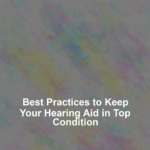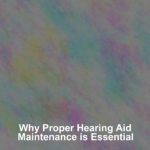Imagine youG??ve just invested in a high-quality pair of hearing aids, expecting them to enhance your daily interactions and overall quality of life. YouG??re not alone in this; countless individuals rely on these sophisticated devices for clear communication every day.
However, to ensure they function optimally for years to come, thereG??s a handful of maintenance practices youG??ll need to adopt. YouG??ve probably been told to keep them dry and clean, but thereG??s more to it than just wiping them down with a cloth. From the specific way you should handle batteries to the techniques that protect the delicate internal components, thereG??s a treasure trove of simple yet crucial steps that can prolong the life of your hearing aids.
YouG??ll want to make sure youG??re in the know, as understanding these practices can save you both time and money in the long run, not to mention the inconvenience of preventable repairs. So, letG??s explore how you can maximize the durability and efficiency of your hearing aids with some key maintenance strategies that you might not yet be aware of.
Daily Cleaning Routine
To ensure optimal performance and longevity of your hearing aids, itG??s crucial to establish a daily cleaning routine. Dirt, earwax, and moisture can accumulate and affect the quality of sound or even damage your device. HereG??s how you can keep your hearing aids in top shape.
First, youG??ll need a soft, dry cloth or a special brush provided by your hearing aid manufacturer. Gently wipe the surface of the hearing aid to remove any visible debris. DonG??t forget to clean the microphone ports and the sound outlet using the brush, as these areas are particularly prone to wax buildup.
Next, inspect the earwax filter or guard. If itG??s clogged, replace it immediately. Most hearing aids come with extra filters, so you donG??t have to worry about running out.
Moisture Control Measures
Keeping your hearing aids dry is essential, as moisture can cause serious damage to the delicate internal components. Whether itG??s from sweat, rain, or humidity, youG??ve got to be vigilant about moisture control to ensure your hearing aids function properly for years to come.
Firstly, always remove your hearing aids before showering, swimming, or any activities that expose them to water. ItG??s easy to forget theyG??re there, but itG??s crucial for their longevity. After any exposure to moisture, like a sweaty workout or a rainy walk, wipe them down gently with a dry, soft cloth.
Invest in a dehumidifier or a drying box designed for hearing aids and use it nightly. These devices pull moisture out of your hearing aids while you sleep, keeping them in top-notch condition. If you donG??t have access to these, at the very least, open the battery compartment and leave the hearing aids in a dry, well-ventilated area overnight.
Battery Care and Replacement
Ensure you regularly check and change your hearing aidsG?? batteries to prevent power loss and potential damage to the device. Hearing aids are intricate devices that rely on a consistent power supply to function correctly. Batteries can die unexpectedly, which not only leaves you without assistance but can also cause your hearing aids to reset or lose programming settings.
When handling batteries, you should be mindful of several things to maximize their lifespan and your hearing aidsG?? performance:
- Store batteries at room temperature: Extreme temperatures can shorten battery life.
- Turn off hearing aids when not in use: This practice extends battery life.
- Check for corrosion regularly: Corrosion can damage the battery compartment and contacts, leading to poor performance or failure.
Remember to keep spare batteries on hand, but donG??t carry them loose in your pocket or purse to avoid short-circuiting. Also, be aware of the battery type required for your hearing aids, as there are different sizes and voltages. Lastly, if you notice a decline in performance or if itG??s been a while since the last change, itG??s time to replace the batteries. Regular battery care ensures your hearing aids remain a reliable support in your daily life.
Regular Performance Checks
Regularly conducting performance checks on your hearing aids can help detect issues before they escalate into costly repairs. ItG??s essential to ensure theyG??re functioning optimally. Start by listening to the sound quality; it should be clear and free from distortion or intermittent cut-outs. If you notice any crackling or static, it might indicate a problem with the microphone or receiver.
You should also check the earmolds and tubing for any signs of damage or blockage. If you find any debris, gently clean it out. Remember, wax buildup can drastically reduce performance. If youG??re using a hearing aid with a disposable battery, test the battery life regularly to ensure itG??s not draining too quickly, which could signal an electrical issue.
Lastly, donG??t forget about the program and volume settings. They should respond accurately to adjustments. If the controls arenG??t responding as they should or if youG??re experiencing feedback when there shouldnG??t be any, itG??s time to consult your audiologist.
Safe Handling and Storage
After checking your hearing aids for functionality, itG??s crucial to focus on how you handle and store them to prevent damage and maintain their condition. By incorporating a few simple habits into your routine, you can extend the life of your hearing aids and ensure theyG??re always ready when you need them.
HereG??s what you need to keep in mind:
- Always handle with clean, dry hands: This minimizes the risk of transferring dirt and moisture to your hearing aids, which can cause damage over time.
- Use a proper storage case: When youG??re not wearing your hearing aids, store them in a secure, hard-shell case to protect them from physical damage and environmental hazards.
- Keep them away from pets and children: Curious pets and children might see your hearing aids as toys, which can lead to accidental damage or ingestion.
Conclusion
YouG??ve got the basics to keep your hearing aids in top shape. Remember, clean them daily to prevent buildup, and always handle them with care. Keep moisture at bay to protect their delicate components.
Stay on top of battery life to ensure theyG??re ready when you need them. Regular checks will catch any issues early on. And when youG??re not using them, stow them safely.
Follow these steps, and your hearing aids will be your reliable partners for years to come.







